Strategic Analysis Balkan Brief
Review of the second half of May 2023
Petra Bošková, Tibor Čech, Lýdia Chobotová, Sára Gregová, Zuzana Šmilňáková, Matej Jadroň
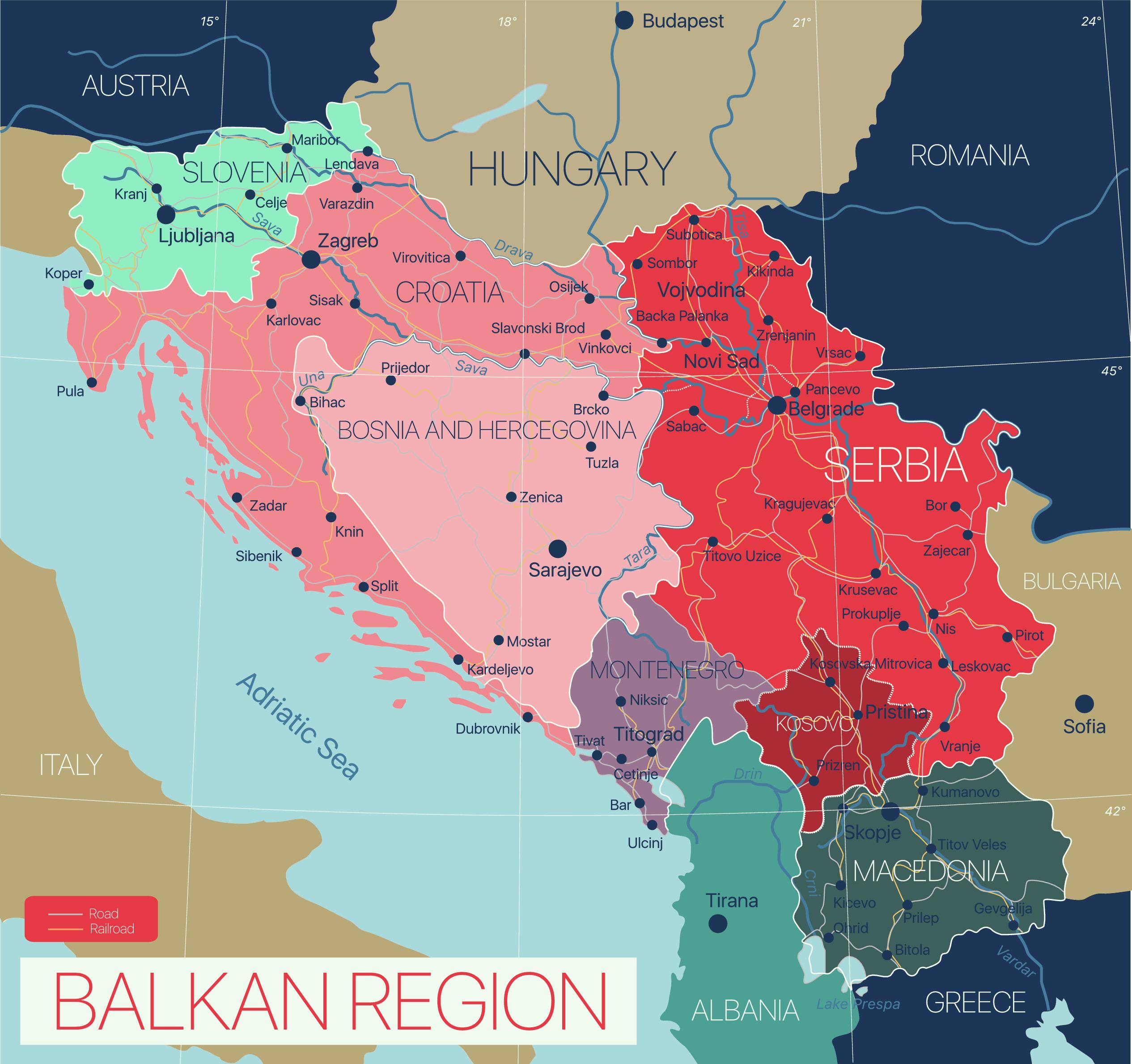
Map of the Balkan region; Graphics: Olinchuk/Shutterstock
Albania
Albanian election in 2023
On May 15, 2023, the elections were held in Albania. Citizens were voting for mayors and 61 local councillors. The previous election took place in 2019 and was boycotted by the opposition over allegations of vote buying and voter intimidation. Albanian government had invited a mission to observe the elections by the Congress of Local and Regional Authorities of the Council of Europe that deployed a mission to observe the local elections on May 14, 2023, in 61 municipalities. The Congress mission was headed by Stewart Dickson (United-Kingdom, ILDG) and involved 20 Congress observers, including 15 Congress members, one expert and four members of the Secretariat from 16 countries.
The turnout of the elections was the lowest in history, resulting in only 35%, compared to 47% in 2021. First-time voters’ turnout was only around 13%, which shows Albanian youth’s engagement problem. This could be due to their inactivity or, at the same time, to their being abroad and working in the EU countries.
According to the official results, Albania’s ruling Socialist Party (SP), led by Prime Minister Edi Rama, will lead 53 of the country’s 61 municipalities in the next four years following the local elections. The Socialists were able to win not only in the important municipalities but also in the traditional Democrat strongholds, such as the Shkodra and Kamza municipalities.
Some minor illegal incidents were reported, but not as serious as they were in 2019. At the same time, dozens of complaints were indicated by the local CSOs and NGOs as well as opposition about the administrative resources to help with the elections for the ruling Socialist Party. The preliminary results show that the current PM’s Socialist Party will be in power for the next four years.
Sources:
- Sinoruka Fjori, Balkan Insight, “Ruling Socialists Defeat Divided Opposition in Albanian Local Polls” https://balkaninsight.com/2023/05/15/ruling-socialists-defeat-divided-opposition-in-albanian-local-polls/.
- Taylor, Alice, Euractiv, “Preliminary results show sweeping Socialist victory in Albanian local vote”, https://www.euractiv.com/section/politics/news/preliminary-results-show-sweeping-socialist-victory-in-albanian-local-vote/,
- Council of Europe, “Local elections in Albania largely well-administered, but lack of focus on local issues” https://www.coe.int/en/web/congress/-/local-elections-in-albania-elections-largely-well-administered-but-characterised-by-continued-polarisation-and-lack-of-focus-on-local-issues
Bosnia and Herzegovina
BIH government’s approval of controversial gas pipeline from Serbia
BIH state-level executive government voted in favour of the construction of two pipelines to deliver gas from Russia and Azerbaijan via Serbia and Croatia. The first planned gas pipeline New Eastern Interconnection would enable to purchase of gas from Russia that would be delivered via Serbia. It will bring natural gas to the cities of the Serb-dominated Republika Srpska entity. The second pipeline to be negotiated is called the Southern Interconnection. It would deliver gas from Azerbaijan through Croatia, and it would run through the Croat- and Bosniak-dominated Federation entity.
However, the approval of the construction of Eastern Interconnection is controversial. The president of Republika Srpska, Milorad Dodik, started the project with Serbia before obtaining approval from the state-level central government, and he also threatened to paralyse state institutions if the project was not approved.
The largest Bosniak party, the Party of Democratic Action, and the Croat member of the Bosnian tripartite presidency, Zeljko Komsic, disagree with the pipeline’s construction. According to Komsic, the new pipeline would „separate the energy infrastructure…from everything that belongs to BIH, including what goes to Sarajevo, and integrate the energy infrastructure with Serbia“. On the other side, the Party of Democratic Action claimed that without establishing a state regulator, the so-called Law on Regulator, and adopting the state-level Law on Gas, the supply and gas prices for the consumers in BIH would be controlled by the regulator under Dodik’s control.
Nevertheless, the Federation of BIH and the entity of Republika Srpska cannot reach the consensus necessary to adopt a state-level Law on Gas. Republika Srpska has withheld its approval for the adoption of a state-level Law on Regulator, and instead, it has adopted an entity-level Law on Gas. The entity-level Law on Gas transfers the competencies that should be delegated to the state-level institutions to entity-level authorities.
Currently, Bosnia and Herzegovina completely depends on Russian natural gas delivered to the country through the Turk Stream pipeline via Turkey and Serbia. The construction of the Southern Interconnection is supported by the European Union and the United States since it would end BIH’s complete dependency on Russian gas deliveries by receiving gas also from Azerbaijan and Croatia.
Sources:
- Azem Kurtic, Balkan Insight, „Bosnian Ministers Approve Controversial Gas Pipeline from Serbia“,https://balkaninsight.com/2023/05/12/bosnian-ministers-approve-controversial-gas-pipeline-from-serbia/
- RFE/RL, „Bosnia Approves Negotiations For Construction Of Two Pipelines To Deliver Gas From Russia, Azerbaijan“ https://www.rferl.org/a/bosnia-gas-pipelines-russia-azerbaijan/32407714.html
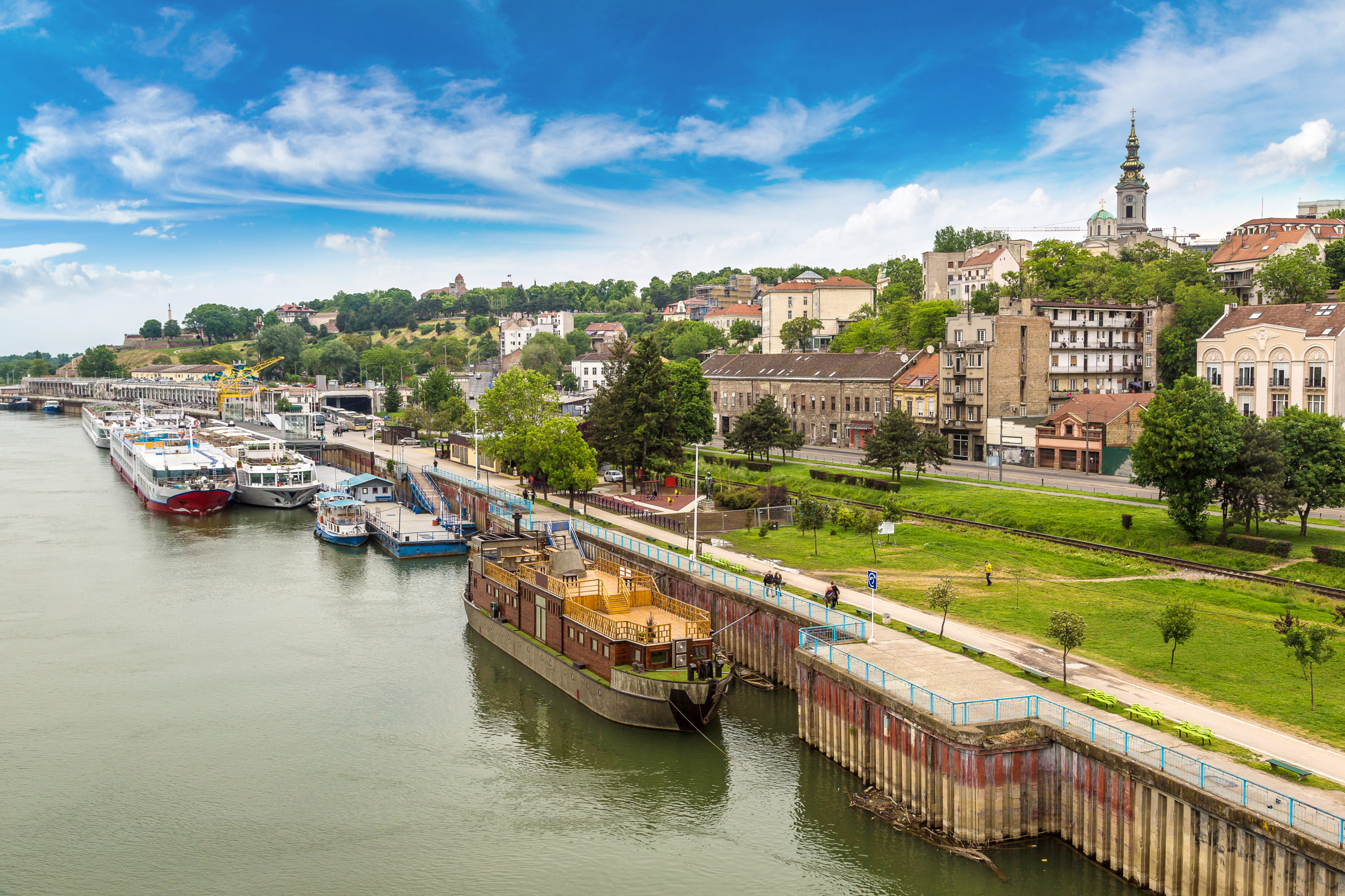
Belgrade, Serbia. Photo: Shutterstock.com
Croatia
The Croatian president compares the Ukrainian slogan “Slava Ukraini” to the Nazi salute
On June 1, 2023, at an awards ceremony in Zagreb, Milanović told reporters that the Ukrainian slogan – used widely since the Russian intervention in 2014 and even more so since last year’s full-scale invasion – is a throwback to the killing of Jews and Poles during early 20th century conflicts in Eastern Europe.
“This is the chant of the most radical chauvinists from Western Ukraine who collaborated with Nazis, who killed hundreds of thousands of Poles, Jews, and anyone else they got their hands on,” Milanović said at the event.
“Slava Ukraini”, which translates to “Glory to Ukraine” and is usually followed by the response “Glory to the Heroes”, is a national salute and the official battle cry of the Armed Forces of Ukraine.
Ukrainian President Volodymyr Zelenskyy regularly ends his public speeches with this phrase. It has become ubiquitous in the country as a sign of national resolve, similar to the British wartime slogan “Keep Calm and Carry On”.
Milanović compared it to the chant used by sympathisers of the Croatian World War II-era Nazi puppet state, known as the Independent State of Croatia or NDH. It was led by some of Europe’s most fervent Hitler adherents, who conducted brutal ethnic cleansing campaigns.
The slogan has been banned for public use by several Croatian Constitutional Court decisions. On three separate occasions, the court ruled the slogan’s use to be an expression of racist ideology.
Sources:
- Una Hajdari, Euronews, „Croatian President Milanovic Compares „Slava Ukraini“ Salute to „Sieg Heil“, https://www.euronews.com/2023/06/01/croatian-president-milanovic-compares-slava-ukraini-salute-to-sieg-heil
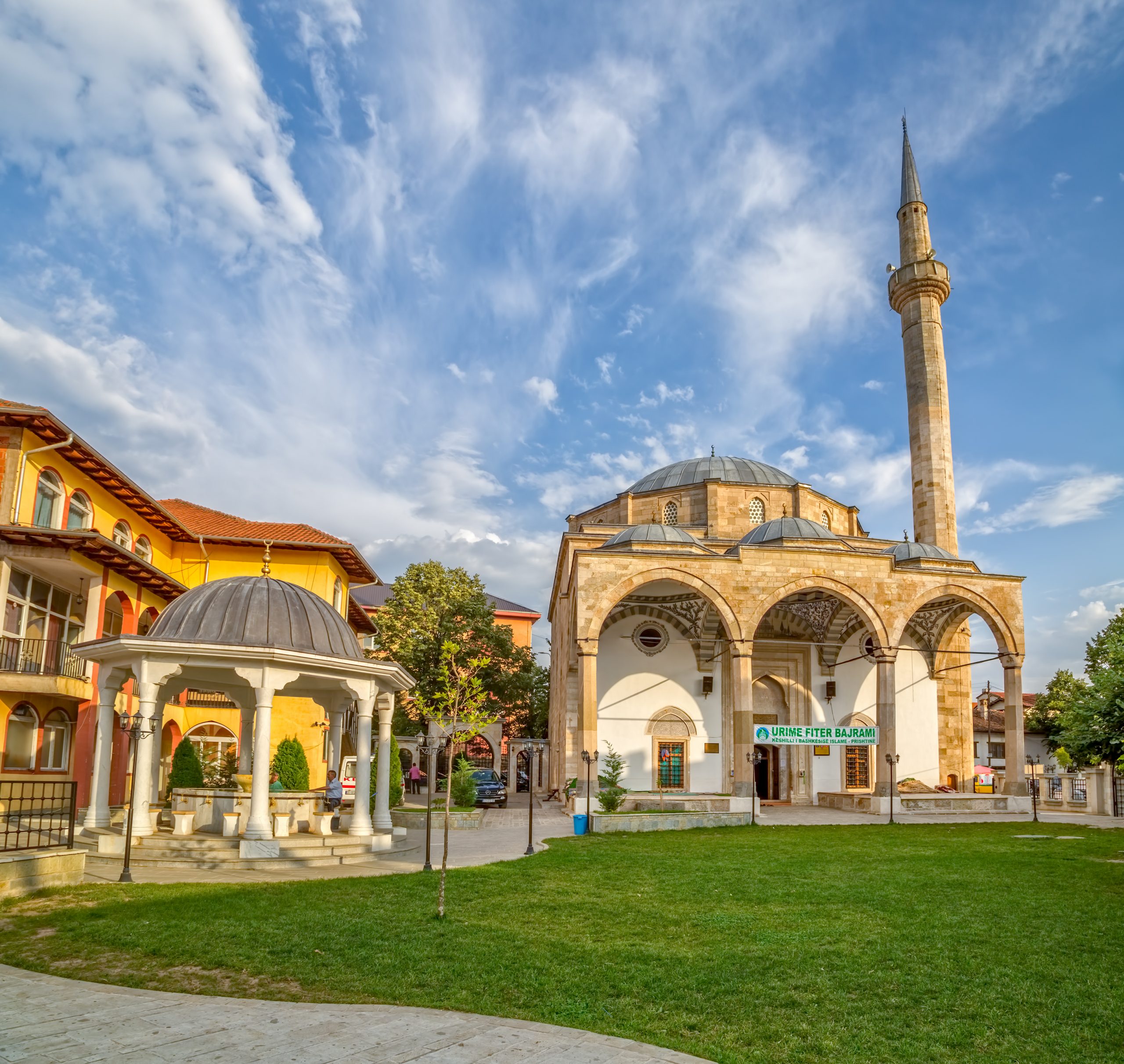
Pristina, Kosovo. Photo: Shutterstock.com
Kosovo
Kosovo-Serbia dialogue and the Association of Serb-majority Municipalities
The most complex condition preventing the implementation of the normalisation agreement between Kosovo and Serbia is the establishment of the Association of Serb-majority Municipalities. The Association would grant more autonomy and rights to the Kosovo Serbs. Kosovo, on multiple occasions, declared that such Association is against the Kosovo Constitution and its establishment was blocked by the Constitutional Court in 2015. Furthermore, Kosovo PM Kurti declared that Kosovo does not want anything resembling Republika Srpska in Bosnia and Herzegovina, as a structure serving as a Serbian satellite would have “a destructive essence that would undermine the citizenship of Kosovo.” On the other hand, Serbia expressed that the establishment of the Association is key for Serbia´s signature of the normalisation agreement.
Therefore, as the mediator of the normalisation talks, the EU has been trying to reach a consensus between the countries. Thus, the European Union Special Representative for the Kosovo-Serbia dialogue, Miroslav Lajčák, has had multiple regional meetings in the past few weeks.
Both countries in the EU-led dialogue laid down conditions and models for establishing the Association, however, the parties could not reach a deal and blamed each other for doing so. Serbian President Vučić said that “Pristina does not want to fulfil the obligation [to create the Association]. It’s clear to me we’ve reached a wall.”
Meanwhile, Kosovo PM Kurti expressed that Kosovo was willing to find a solution, however, Serbia has been allegedly violating other obligations of the normalisation agreement. Despite these comments, Lajčák stressed that the meetings are “a crucial step forward, and it’s important to avoid any actions that could worsen the atmosphere.” Lajčák also indicated that more meetings between Kosovo and Serbia are planned soon to resolve the establishment of the Association of Serb Municipalities.
Sources:
- Alexandra Brzozowski, EURACTIV, “Kosovo, Serbia fall short of diffusing tensions, agree to resolve war missing cases”, https://www.euractiv.com/section/enlargement-neighbourhood/news/kosovo-serbia-fall-short-of-diffusing-tensions-agree-to-resolve-war-missing-cases/
- Alice Taylor, EURATIV, “Kosovo: Serbia normalisation dialogue articles not conditional on each other”, https://www.euractiv.com/section/politics/news/kosovo-serbia-normalisation-dialogue-articles-not-conditional-on-eachother/
- Alice Taylor, EURACTIV, “Lajcak visits Kosovo to build and cross bridges amid ongoing Serbia dialogue”, https://www.euractiv.com/section/politics/news/lajcak-visits-kosovo-to-build-and-cross-bridges-amid-ongoing-serbia-dialogue/
- Alice Taylor & Bojana Zimonjic, EURACTIV, “Kosovo’s Kurti: No Republika Srpska in the country”,https://www.euractiv.com/section/politics/news/kosovos-kurti-no-republika-srpska-in-the-country/
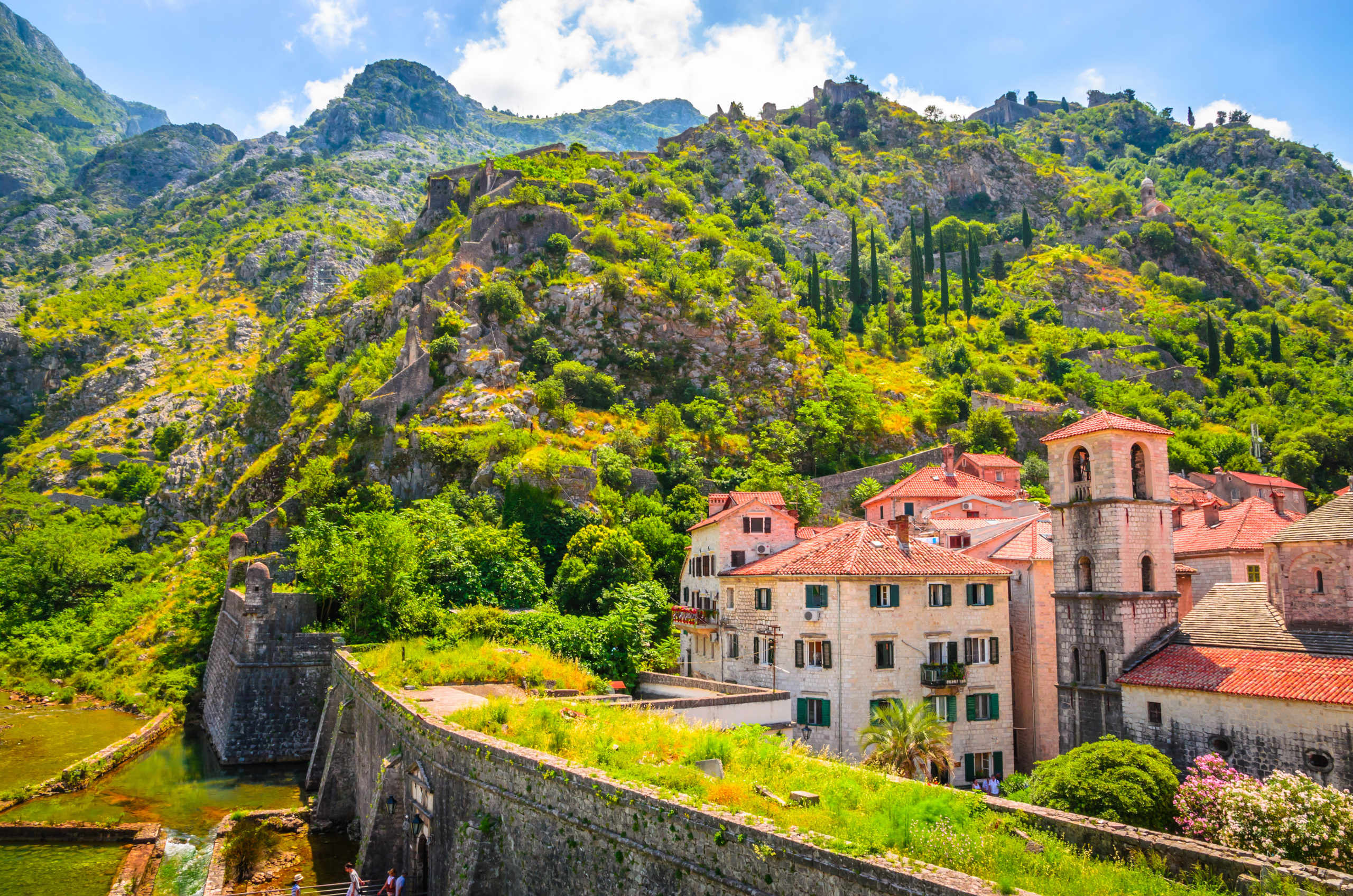
Kotor, Montenegro. Photo: Shutterstock.com
Montenegro
Changes in the political scene before upcoming parliamentary elections
On June 11, Montenegro will hold early parliamentary elections and political parties have been forming new party coalitions and ceasing some others. After 11 years, the ruling Democratic Front political alliance has dissolved. Andrija Mandic, president of the New Serbian Democracy party, which was one of three parties forming the Democratic Front alliance, expressed during a press conference that “after Milo Djukanovic’s electoral defeat [in recent presidential elections], we decided to continue our political struggle individually. There is no conflict between us, but the constituent parties decided to take different paths towards the same goal”.
Thus, the New Serbian Democracy and the Democratic People’s Party will run in the election as a coalition, and the Movement for Changes will run on its own. Ana Nenezic, executive director of a non-governmental organisation CEMI, believes that this alliance dissolution was inevitable after Mandic´s poor results in the presidential elections as he came in third with 19% of votes, therefore the parties needed to “reposition themselves and return to their initial radical positions”.
After Milo Djukanovic resigned as the head of the Democratic Party of Socialists after his defeat in the presidential elections earlier this year, further political changes in the party occurred too. The party announced they will form a coalition with the Social Democrats, the Liberal Party and the Democratic Union of Albanians ahead of the parliamentary elections.
The newly formed coalition stresses that it will be led by young politicians, thus, many of the parties´ high-ranking veteran politicians have either resigned from their positions as party leaders or will not run in the elections. Nenezic again comments that these moves were expected as the opposition parties have understood that the veteran politicians were one of the causes of declining voter support of the opposition.
Moreover, the new president´s Milatovic´s Europe Now! party is leading the opinion polls ahead of the elections with 30%. The party also consists of young politicians and is campaigning with promises to tackle corruption and the shortcomings in the rule of law, so Montenegro can speed up its EU accession process.
Sources:
- Marton Dunai, Financial Times, “Montenegro’s young guard aims to speed up EU accession”,https://www.ft.com/content/d18f3ec1-81b8-4bac-a54c-5b8e3c261434
- Samir Kajosevic, Balkan Insight, “Montenegrin Parties Revamp Political Scene Ahead of Elections”, https://balkaninsight.com/2023/05/15/montenegrin-parties-revamp-political-scene-ahead-of-elections/
North Macedonia
North Macedonia appreciates Slovak support of EU Integration
Minister of Foreign Affairs Bujar Osmani, on May 30, 2023, met with the Slovak Minister of Foreign and European Affairs Miroslav Wlachovský, on the occasion of the GLOBSEC 2023 Bratislava Forum, informed his counterpart that he appreciates Slovakia’s constant support for the European integration of North Macedonia. Minister Osmani congratulated Wlachovský on his appointment as Minister of Foreign and European Affairs and expressed his belief that in the coming period, both countries will work on the EU enlargement process, especially in the current context, when the security architecture in Europe is facing big challenges.
“We value Slovakia’s continued support for our European integrations. Additionally, we believe that Slovakia will provide its support for the concept of accelerated integration and support the process so that it can be more credible and so that our citizens are able to feel the short-term, temporary steps,” said Osmani.
The Prime Minister of North Macedonia, Kovachevski, said also at the GLOBSEC 2023 Forum that „A united Europe is the only answer to the crises and challenges caused by Russian aggression in Ukraine, which has negative effects on the economy and energy.“
“I expect that we will discuss the current challenges and the way in which we deal with the crises, as well as the importance of a united Europe because only a united Europe can support the Ukrainian people’s fight for their independence and self-determination. Additionally, a united Europe is also the best answer to the crises and challenges caused by this war, which has negative effects on the economy and energy,” said Kovachevski.
As a member of several international organisations, NATO, the presiding country of the OSCE and a country that started its accession talks to the EU, Kovachevski stressed that North Macedonia must be actively involved in building collective responsibility for peace, building democracy and human rights as well as fostering good neighbourly relations because it is the only way to have a stable and economically strong region in Europe.
GLOBSEC in Bratislava is attended by heads of state and government from all over the world as well as representatives of international organisations. The topics discussed at the conference this year were focused on three areas, namely support for Ukraine, the resilience of Europe, as well as mitigating the global consequences of the conflict, thereby economic and energy strengthening.
Sources:
- Медиумскаинформативнаагенција, „Kovachevski at GLOBSEC Forum: United Europe – only answer to crises and challenges“, https://mia.mk/en/story/kovachevski-at-globsec-forum-united-europe-only-answer-to-crises-and-challenges
- Медиумскаинформативнаагенција, „Osmani – Wlachovský: N. Macedonia values Slovakia’s support for EU integrations“, https://mia.mk/en/story/osmani-%E2%80%93-wlachovsk%C3%BD-n.-macedonia-values-slovakias-support-for-eu-integrations
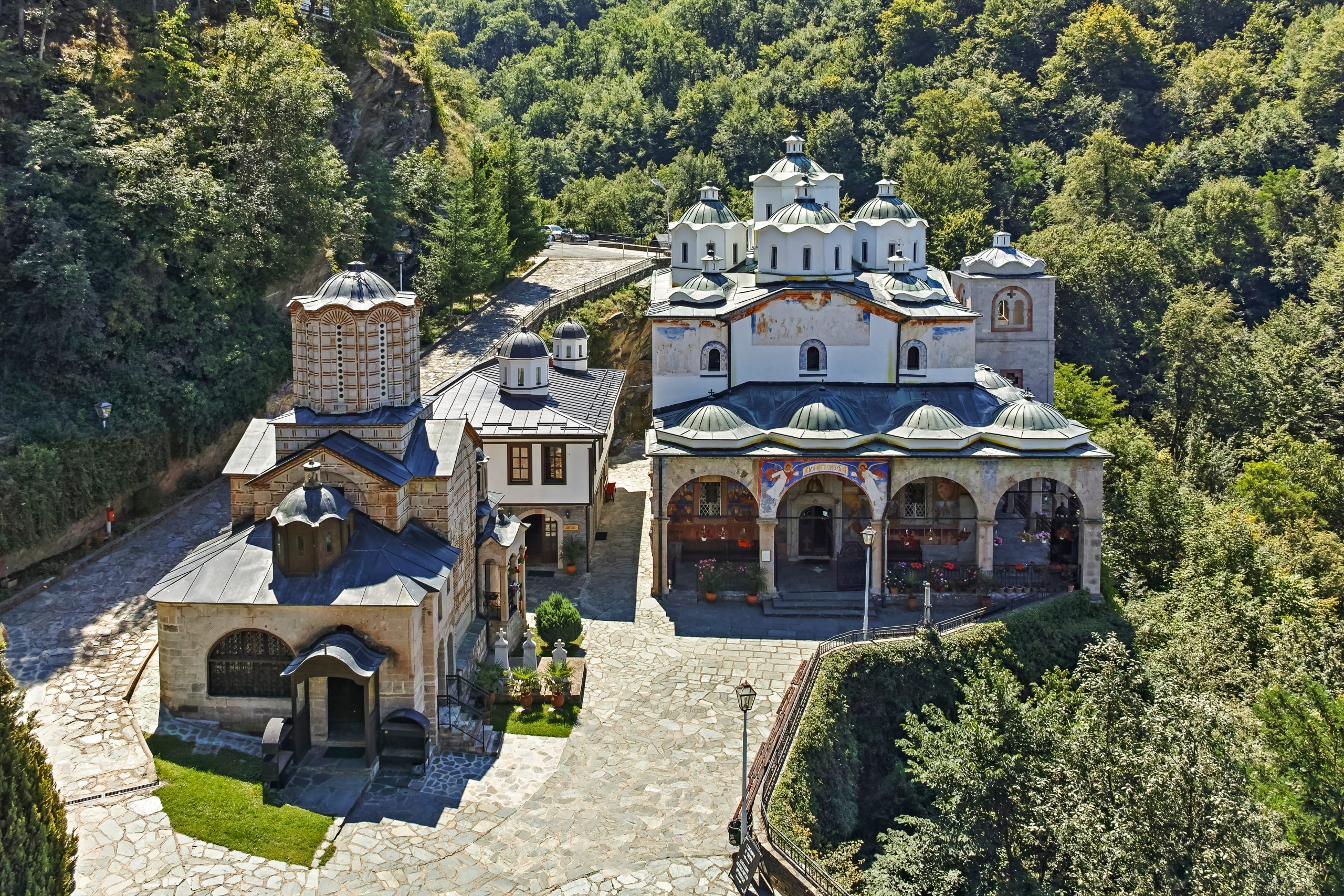
Monastery in North Macedonia. Photo: Shutterstock.com
Serbia
President Vučić resigns as a leader of his party amidst protests
Thousands have been demonstrating in the Serbian capital over the past few weeks to stop violence in the country. The protests were sparked by the two mass shootings that resulted in the death of 18 people, many of whom were schoolchildren, at the beginning of May. Organised by the opposition parties, the demonstrations quickly gained an anti-government element and are being compared to those that resulted in the ousting of former Serbian President Slobodan Milošević.
Protesters are accusing the governing Serbian Progressive Party (SNS) of supporting a culture of violence through pro-government media that target political opposition and insist on revoking their broadcasting licences. They also demand the resignation of Interior Minister Bratislav Gasic as well as the director of the Serbian Security Agency – BIA, Aleksandar Vulin. The opposition parties have been complaining about corruption and an autocratic turn under SNS for years.
As a reaction to the situation, President Vučić held a pro-government rally in Belgrade on Friday, May 26. He criticised the opposition for using the national tragedy to galvanise political support. Buses full of people also came to his event from neighbouring countries, such as Bosnia and Herzegovina, Kosovo, Montenegro and North Macedonia.
Among the attendees were Hungarian Foreign Minister Peter Szijjarto and the leader of Bosnian Serbs, Milorad Dodik. According to Szijjarto, Hungary and Serbia are being attacked by “the international liberal mainstream”. Dodik expressed identical sentiments when he said that “They attack us because we want peace in Ukraine, they attack us because we believe in family values and because we refuse to be told what to do.”
Only a day later, at the party congress in Kragujevac, Vučić announced that he was leaving the leadership position in the SNS. He appointed the current Defense Minister as his successor while he will remain a member. The party will join a new political organisation that will be established at the end of June. The unofficial name for a new movement of the SNS and supportive parties is the People’s Movement for The State. Just hours after this announcement, another anti-government protest took place in Belgrade. Chanting the same demands, demonstrators even surrounded the state television building.
Sources:
- Jovana Gec, AP News, Protesters encircle Serbian state TV building to press the government to ease its grip on media, https://apnews.com/article/serbia-vucic-new-leader-party-protests-shootings-2c7a8f8a7bfb88b48414220dca122521
- Al Jazeera, Huge crowds protest Serbia shootings as Vucic plans new movement,https://www.aljazeera.com/news/2023/5/27/serbias-vucic-steps-down-as-head-of-ruling-party
- Reuters, Serbia’s President Vucic steps down as head of the ruling party, https://www.reuters.com/world/europe/serbias-president-vucic-offers-resignation-head-ruling-party-2023-05-27/
- Aleksandar Vasovic, Tens of thousands in Serbia protest mass shootings, government policies, https://www.reuters.com/world/europe/tens-thousands-serbia-protest-mass-shootings-government-policies-2023-05-27/
- Reuters, Tens of thousands gather in Serbia in Vucic’s show of power, https://www.reuters.com/world/europe/tens-thousands-gather-serbia-vucics-show-power-2023-05-26/

Contact us